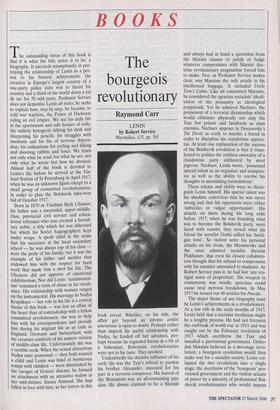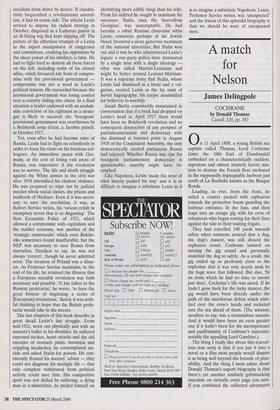BOOKS
The bourgeois revolutionary
Raymond Carr
LENIN by Robert Service Macmillan, £25, pp. 561 The outstanding virtue of this book is that it is what the title states it to be: a biography. It succeeds triumphantly in por- traying the relationship of Lenin as a per- son to his historic achievement: the creation in Europe's largest country of a one-party police state was to thrust his country and a third of the world down a cul de sac for 70 odd years. Professor Service does not demonise Lenin ab initio; he seeks to explain how, step by step, he became, to cold war warriors, the Prince of Darkness ruling an evil empire. We see his daily life in the apartments and safe houses of exile; the orderly bourgeois tidying his desk and sharpening his pencils; his struggles with insomnia and his fits of nervous depres- sion; his enthusiasm for cycling and hiking and shooting rabbits and foxes. We learn not only what he read, but what he ate; not only what he wrote but how he dressed. Almost half of the book is devoted to Lenin's life before he arrived at the Fin- land Station of St Petersburg in April 1917, when he was an unknown figure except to a small group of conunitted revolutionaries, in order to plan the Bolshevik take-over bid of October 1917.
Born in 1870 as Vladimir Ilych Ulyanov, his father was a successful, upper-middle- class, provincial civil servant and educa- tional reformer who was created a heredi- tary noble, a title which his son inherited but which his Soviet hagiographers kept under wraps. A spoilt child in the sense that his successes at the local secondary school — he was always top of his class — were the pride of his family; but it was the example of his father and mother that endowed him with the respect for hard work that made him a swot for life. The Ulyanovs did not approve of emotional exhibitionism. Nor did Lenin: 'sentimental- ism' remained a term of abuse in his vocab- ulary. His relationship with women verged on the instrumental. His marriage to Nadya Krupskaya — her role in his life is a central theme of this book — was less an affair of the heart than of comradeship with a fellow committed revolutionary; she was to help him with his correspondence and provide him during his migrant life as an exile in England, Germany and Switzerland, with the creature comforts of his austere version of middle-class life. Unfortunately she was a terrible cook. When the sexual attractions Nadya once possessed — they both wanted a child and Lenin was fond of boisterous romps with children — were diminished by the ravages of Graves' disease, he formed an attachment with an attractive widow in her mid-thirties, Inessa Armand. She had fallen in love with him, as her letters in this book reveal. Whether, on his side, the affair got beyond an intense amide amoureuse is open to doubt. Perhaps rather than imperil his useful relationship with Nadya, he fended off her advances, per- haps because he regarded Inessa as a bit of a bohemian. Bohemian revolutionaries were not to his taste. They smoked.
Undoubtedly the decisive influence of his early life was the Tsar's refusal to pardon his brother Alexander, executed for his part in a terrorist conspiracy. His hatred of the Romanovs was an all-consuming pas- sion. He always claimed to be a Marxist and always had at hand a quotation from the Marxist classics to justify or fudge whatever compromises with Marxist doc- trine revolutionary pragmatism forced him to make. Nor, as Professor Service makes clear, was Marxism the only article in his intellectual baggage. It included Uncle Tom's Cabin. Like all committed Marxists, he considered the agrarian socialists' ideali- sation of the peasantry as ideological poppycock. Yet he admired Nechaev, the proponent of a terrorist dictatorship which would eliminate physically not only the Tsar but priests and landlords as class enemies. Nechaev appears in Dostoevsky's The Devils as ready to murder a friend in order to discipline his clandestine appara- tus. At least one explanation of the success of the Bolshevik revolution is that it trans- ferred to politics the ruthless amorality of a clandestine party infiltrated by stool pigeons. Nechaev, Lenin wrote, 'possessed special talent as an organiser and conspira- tor as well as the ability to enrobe his thoughts in astonishing formulations'.
These talents and ability were to distin- guish Lenin himself. His special talent was his absolute conviction that he was never wrong and that his opponents were either 'imbeciles or vulgar opportunists'. His attacks on them during his long exile before 1917, when he was founding what was to become the Bolshevik party, were laced with venom; they reveal what his friend the novelist Gorki called his 'hooli- gan tone'. So violent were his personal attacks on his rivals, the Mensheviks and the once admired socialist theorist Plekhanov, that even his closest collabora- tors thought that his refusal to compromise with his enemies amounted to madness. As Robert Service puts it, he had lost 'any ves- tigial sense of proportion'. His weapon in controversy was words; speeches could cause near nervous breakdown. In May 1917 he turned out 48 articles for Pravda.
The major theme of any biography must be Lenin's achievements as a revolutionary. At a low ebb in the early months of 1917, Lenin held that a socialist revolution might be a lengthy process. He had not foreseen the outbreak of world war in 1914 and was caught out by the February revolution of 1917 which overthrew the Tsar and installed a provisional government. Ortho- dox Marxists believed in a two-stage revo- lution: a bourgeois revolution would then make way for a socialist society. Lenin col- lapsed the two revolutions into a single stage: the overthrow of the 'bourgeois' pro- visional government and the violent seizure of power by a minority of professional Bol- shevik revolutionaries who would impose socialism from above by decree. If clandes- tinity bequeathed a revolutionary amoral- ism, it had its comic side. The atheist Lenin arrived to impose his radical strategy in October, disguised as a Lutheran pastor in an ill-fitting wig that kept slipping off. The picture of the effortless triumph of a Lenin as the expert manipulator of congresses and committees, crushing his opponents by the sheer power of his intellect, is false. He had to fight hard to destroy all those forces on the left, including some of his closest allies, which favoured any form of compro- mise with the provisional government — compromise was not a word in Lenin's political lexicon. He succeeded because the provisional government was losing control over a country sliding into chaos. In a fluid situation a leader endowed with an unshak- able conviction of his rightness as a strate- gist is likely to succeed: the 'bourgeois' provisional government was overthrown by a Bolshevik coup d'dtat, a Jacobin putsch, in October 1917.
Yet, even after he had become ruler of Russia, Lenin had to fight on relentlessly in order to force his views on his fractious col- leagues. An immediate peace with Ger- many, at the cost of losing vast areas of Russia, was imperative if the revolution was to survive. The life and death struggle against the White armies in the civil war after 1918 intensified his choleric violence. He was prepared to wipe out by judicial murder whole social classes, the priests and landlords of Nechaev. Even if it was neces- sary to save the revolution, it was, as Robert Service writes, his 'vicious relish in exemplary terror that is so disgusting'. The New Economic Policy of 1921, which allowed a compromise with capitalism and the market economy, was another of the 'strategic somersaults' which even Bolshe- viks sometimes found insufferable; but the NEP was necessary to save Russia from starvation. Needless to say, he was not always 'correct', though he never admitted error. The invasion of Poland was a disas- ter. As Professor Service maintains, to the end of his life, he retained the illusion that a European socialist revolution was both necessary and possible. 'It has fallen to the Russian proletariat,' he wrote, 'to have the great honour of beginning a series of [European] revolutions.' Surely it was wish- ful thinking to hope that the British prole- tariat would take to the streets.
The last chapters of this book describe in great detail Lenin's last struggle. From mid-1921, worn out physically and with an assassin's bullet in his shoulder, he suffered repeated strokes, heart attacks and the old enemies of stomach pains, insomnia and crippling headaches; he contemplated sui- cide and asked Stalin for poison. He con- sistently flouted his doctors' advice — they could not diagnose his multiple ills — that only complete withdrawal from political activity could save him. His competitive spirit was not dulled by suffering: a dying man in a wheelchair, he prided himself on identifying more edible fungi than his wife. From his sickbed he sought to nominate his successor. Stalin, once the 'marvellous Georgian', was unacceptable. He had become a rabid Russian chauvinist while Lenin, conscious perhaps of his Jewish blood, favoured a more generous treatment of the national minorities. But Stalin won out and it was he who administered Lenin's legacy: a one-party police state dominated by a single man with a single ideology — what was called Marxist-Leninism and might be better termed Leninist-Marxism. It was a supreme irony that Stalin, whom Lenin had dismissed as a brute and a vul- garian, created Lenin as the lay saint of Soviet hagiography, his corpse mummified for believers to worship.
Isaiah Berlin consistently maintained in conversation that if a brick had dropped on Lenin's head in April 1917 there would have been no Bolshevik revolution and no consequent destruction of any prospect of parliamentarianism and democracy with the dismissal at bayonet point in August 1918 of the Constituent Assembly, the only democratically elected parliament Russia had enjoyed. Whether Russia was ripe for bourgeois parliamentary democracy is questionable; anarchy might have tri- umphed.
Like Napoleon, Lenin 'made the most of what history pushed his way' and it is as difficult to imagine a substitute Lenin as it is to imagine a substitute Napoleon. Lenin, Professor Service writes, was 'unexpected' and the lesson of this splendid biography is that we should be wary of unexpected men.



































































 Previous page
Previous page